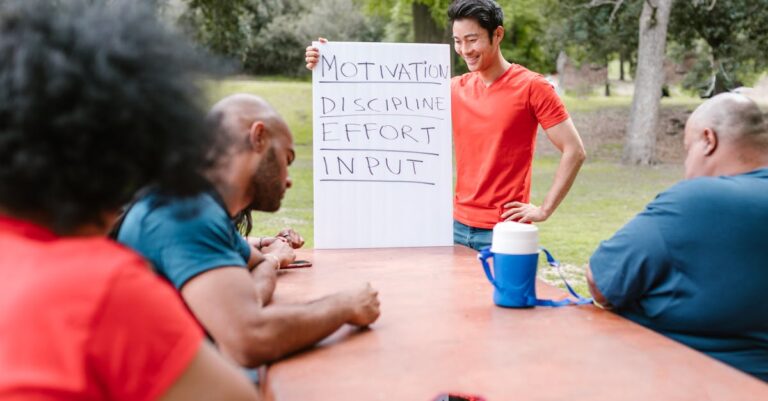Table of Contents
ToggleNavigating the rocky terrain of relationships can feel like trying to assemble IKEA furniture without the instructions. Sometimes, a little professional help can turn that chaos into a well-oiled love machine. But before diving into the world of relationship counseling, many wonder: how much will this emotional GPS cost?
Overview of Relationship Counseling Costs
Understanding the costs associated with relationship counseling is essential for couples considering this path. Multiple factors contribute to the pricing, and recognizing these factors helps set realistic expectations.
Factors Influencing Pricing
Location plays a significant role in determining costs. Urban centers typically see higher rates than rural areas. Therapist qualifications also affect pricing; licensed professionals often charge more than interns or trainees. Session format is another variable. Individual sessions may differ in cost compared to group therapy sessions. Lastly, duration impacts the total expenditure. Sessions lasting 60 minutes or longer might influence overall pricing.
Average Cost Range
On average, relationship counseling sessions range from $100 to $250 per hour. Many therapists operate on a sliding scale based on income, potentially lowering fees for clients. Some insurance plans cover counseling services, affecting out-of-pocket expenses. For couples seeking affordability, packages or multi-session rates may provide savings. Understanding these average costs enables couples to budget effectively for counseling services.
Types of Relationship Counseling
Understanding the types of relationship counseling can help individuals choose the right approach for their specific needs. Several methods exist, each designed to address unique issues in relationships.
Individual Counseling
Individual counseling allows a person to explore personal emotions and thoughts. It focuses on self-improvement and personal growth, helping them understand their needs. Therapists guide clients through issues like anxiety, self-esteem, and past trauma, facilitating insight into behavior patterns. Sessions typically span 50 to 60 minutes, costing between $100 and $250 per hour, with sliding scale fees available. This option suits those seeking to foster healthier relationships through self-awareness and personal development.
Couples Counseling
Couples counseling aims to enhance relationship dynamics between partners. In joint sessions, therapists address communication issues, conflict resolution, and intimacy concerns together. The approach helps partners develop healthier interactions and rebuild trust. Sessions generally last 60 to 90 minutes, with costs ranging from $100 to $250 per hour. Many couples find that this form of counseling strengthens their bond, allowing them to work toward common goals.
Payment Options and Insurance Coverage
Understanding payment options and insurance coverage for relationship counseling is crucial for budgeting effectively. Many individuals and couples explore various methods to manage their expenses.
Self-Payment
Self-payment involves directly covering the cost of counseling sessions. Several clients choose this option for its simplicity and flexibility. Costs typically range from $100 to $250 per hour, depending on factors like location and therapist qualifications. Some therapists provide sliding scale fees based on income to accommodate different financial situations. When a client selects self-payment, they retain complete control over session scheduling and therapy selection. This approach can be particularly beneficial for those without insurance or those seeking confidentiality.
Insurance Claims
Insurance claims can significantly reduce out-of-pocket expenses for relationship counseling. Coverage varies by provider and plan, so it’s essential to verify benefits before starting therapy. Many insurance plans partially or fully reimburse clients for counseling services, often requiring a licensed therapist. Clients usually need to meet a deductible before receiving benefits. Submitting claims for these services may require documentation, such as session receipts or treatment plans. Checking with the insurance company helps clarify details like coverage limits and reimbursement rates, allowing couples to manage counseling costs more effectively.
Geographical Variations in Costs
Costs for relationship counseling vary significantly based on location. Accessibility and demand play a role in determining how much sessions cost across different areas.
Urban vs. Rural Differences
Urban areas typically feature higher costs for counseling sessions. The concentration of therapists and higher living expenses contribute to this pricing structure. In cities, rates generally range from $150 to $250 per hour. Rural regions, on the other hand, often present lower prices, with sessions averaging $100 to $150. Availability of therapists can be limited in less populated areas, yet these practices frequently offer personalized services.
State-Specific Pricing
Price differences also manifest at the state level. States like California and New York see average rates of $200 per hour, while states in the Midwest may offer services for about $100 to $150 per session. Local economies and regulatory factors influence these state-specific costs. Couples should explore prices in their area, as packages or sliding scale options might be available to reduce overall expenses. Keeping an eye on these variations can help couples effectively budget for needed counseling services.
Understanding the costs associated with relationship counseling is essential for couples seeking to improve their dynamics. With prices varying based on location and therapist qualifications, couples can find options that fit their budget. Exploring insurance coverage and sliding scale fees can further ease financial concerns.
By investing in counseling, couples take a proactive step toward fostering healthier relationships. They should consider their unique needs and preferences when selecting a counseling approach. Ultimately, the benefits of relationship counseling can outweigh the costs, leading to stronger and more fulfilling connections.





